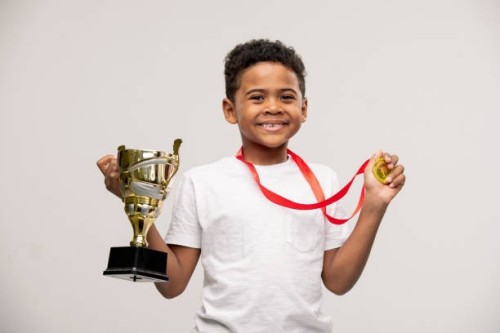
posted 6th February 2023

Trophies in the cabinet at school; certificates on the kitchen wall at home. These are the outward and visible signs of success in debating competitions. Competitions give students focus and purpose when they are training, and a sense of achievement and recognition when they win. But how best to maximise your chances of success? What should coaches and students be doing before, during and after a competition?
Before a competition
Long prep competitions
Coaches
Make sure you forward the motion to the team as soon as you receive it. Add some suggestions for places to research / angles to take. Make sure this covers both their side and the other side; debaters need to spend at least as long on understanding and analysing the counter-arguments as on their own arguments. But don’t give them too much. They need to own their arguments, not repeat their coach’s.
Run a practice debate with the motion, using non-competing members of the debating club as sparring partners. Start by having the team take their side; then run another one where they have to speak for the other side. Be encouraging with your feedback, but also frank. If there are problems, now is the time to fix them. Students will appreciate your candour provided it is accompanied by clear targets and practical strategies.
Students
Get together with your teammates as soon as possible, either in person or online. Start by generating as many arguments as possible, without selection or question. Then rank them in order, and pick out the best. For a five minute speech, three arguments per speaker is optimal.
Do some research for useful facts and figures, but not too much. The greatest danger for long prep debaters is overpreparation. You will win a debate by having well focused arguments, not by reciting long paragraphs from Wikipaedia.
Listen to your coach’s feedback on your practice debate, and write it down in your debating notebook. Refer back to it frequently, until it is fixed on your mind for you to act on.
Short prep debates
Coaches
In the run up to the competition, focus particularly on preparation skills. Run through the basics of how to prepare for a debate with students. Try some of these training exercises. Do some supervised preparation: give students a motion, then listen in on their preparation, making notes on how effectively they use their time. Give them frank but helpful feedback, suggesting how to use their time better.
For debates in British Parliamentary format, performing in role is an often overlooked but vital skill. If you have time, run enough practice debates to give students one go in each of the four positions. Focus particularly in your feedback on how well they have fulfilled their role.
Students
Assemble a list of likely motions in your debating notebook. These might be motions you have used in previous competitions or in your debating club. If you don’t have these, try making some up. Choosing a motion is a very valuable exercise to help you understand how motions work.
When you have the motions, spend as much time as you can with your team mate, either in person or online, analysing them and discussing how you would approach them in a debate. Set up a Whats App group for quickfire discussion of a motion or two when you have a spare moment (not during lessons). Carry on the discussion in the lunch queue and in the playground, on the bus or the Tube. Ignore the funny looks you get. It’s unlikely (though possible) that you will get one of the motions you have prepared, but that doesn’t matter; the important thing is that you will be building up your motion-analysing muscles.
On the day of the competition
Coaches
Get to the venue early, to be there to greet students when they arrive. If you’re accompanying them, use the journey for a bit of last minute coaching. Check in with each student individually, looking out especially for nerves which may need calming, or other things happening in their lives which may be distracting them. Remind them of their key targets. Add a triple dose of encouragement.
Watch as many of the debates as you can. If you have several teams, divide your time as evenly as possible between them. Listen to the judges’ feedback, and reinforce it with students afterwards. Give as much encouragement as you can manage (especially if students have performed disappointingly), allied with a simple, focused target for the next debate.
Subject to the necessary permissions / safeguarding protocols, take as many pictures as you can for social media / school publications.
Students
Get to bed early the night before and have a good breakfast on the morning of the competition. Leave early, to avoid the stress of arriving late in case of transport difficulties. If it’s an after school competition, try to get any outstanding homework out of the way so you’re not stressing about it.
Bring to the competition:
- Your debating notebooks.
- Several pens / pencils.
- Highlighters.
- Index cards.
- The Debating Book
- As many magazines and newspapers as you can assemble. The Week and The Economist are particularly recommended.
- A water bottle.
- Lunch (for an all day competition).
- Snacks
Pace yourself through the day / evening. Use snacks / caffeine as appropriate to keep your energy up, but don’t overdo it. Keep hydrated. It is normal to feel tired by the last debate, but manage your energy levels to minimise this.
Give each other lots of encouragement. If someone makes a mistake, now is not the time to dwell on it.
Listen to judges’ feedback and write it down in your notebook. Use the feedback immediately, in your next debate.
After the competition
Coaches
In the next meeting of the club, spend some time debriefing. Talk through what went well, and what students would do differently next time. Be generous with praise and encouragement. Bring in cake / pastries to thank students for their participation.
If you won, make sure the whole school and most of the internet know about it. If you haven’t, still congratulate the students on their efforts and focus on whatever was positive about the experience.
Students
Reflect, both individually and with your teammates, on the experience. Focus on the positive.
If you won, make the most of it. Accept teachers’ praise (especially if they’re writing your UCAS reference) and allow your parents to swamp social media with pictures of you holding the trophy.
If you lost, start making a plan to win next time.





